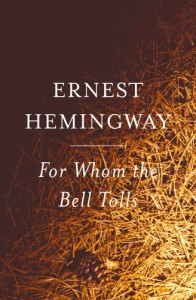 This is the first Hemingway novel I've read, and I recommend it. For Whom the Bell Tolls covers a period of three full days during the Spanish Civil War, following (primarily) a young American professor of Spanish working as a guerrilla explosives expert on the Communist side (although, as we discover, not a Communist himself). The book is well-written, as one would expect of a classic, although not quite as terse as I expected given Hemingway's reputation... but certainly missing the flowery language of many earlier classics, and I suppose that's the point.
This is the first Hemingway novel I've read, and I recommend it. For Whom the Bell Tolls covers a period of three full days during the Spanish Civil War, following (primarily) a young American professor of Spanish working as a guerrilla explosives expert on the Communist side (although, as we discover, not a Communist himself). The book is well-written, as one would expect of a classic, although not quite as terse as I expected given Hemingway's reputation... but certainly missing the flowery language of many earlier classics, and I suppose that's the point. On the merits of the story alone, this is a good book. It's a war story, but don't read it for the action scenes, which are few and far between--far more time is spent getting to know the characters, their lifestyle (living in a cave in the mountains behind fascist lines), and their relationships. There's some backstory dealing with the start of the war and some philosophizing on life, love, the morality of killing in wartime, and so forth. Philosophizing in a novel generally bores me, but kudos to Hemingway for writing these passages the way a person's internal voice (well... mine anyway...) would actually sound; Robert Jordan's thought processes sound like they come from a rational, self-aware sort of man in a war zone rather than an author writing essays in the comfort of his home. There are a couple windows on the "larger picture" as well; my favorite section of the book deals with the myriad difficulties one of the guerrillas has getting into and through territory controlled by his own side.
The characters here are quite well-developed, especially the protagonist... although his love interest, Maria, seems like little more than a vehicle for masculine wish-fulfillment most of the time (except for the priceless scene where she informs him that she's too sore for sex). At least there is another, much better-developed female character to balance that out. Descriptions, while not flowery, are quite vivid. I learned a bit about Spanish culture and history, although my feeling is that Hemingway was writing for an audience who already knew the basics of the war; his story is a microcosm of the conflict, requiring readers to do more research to really understand it.
I would have liked to see a bit more resolution at the end (who survived the day, at least?), but my only real gripe is Hemingway's direct and sometimes inaccurate rendering of Spanish dialogue. His goal--trying to give readers a feel for the Spanish language--is reasonable, but it results in characters saying stilted things that sound ridiculous in English, and sometimes are just plain incorrect. For instance, they say "rare" when they mean "strange," that they don't want to "molest" someone when they want to avoid annoying them ("raro" in Spanish means "strange," and "molestar" means "to annoy"... one would think that a writer like Hemingway must understand the concept of false cognates). And while I understand his use of the "thou" form in an attempt to show the difference between formal and informal forms of address in Spanish, he uses it inconsistently, and statements like "I love thee" in a novel set in the 20th century are just bizarre. For me the translation quickly became annoying and distracting, jolting me out of the story as I found myself translating characters' statements into Spanish to make sense of them.
Still, if you can get past what another reviewer has aptly called the "goofy English," this is certainly a worthy read. Lovers of classics are likely to approve all of Hemingway's editorial decisions, and for the rest, this is a fun way to get to know one of the most famous literary novelists of the 20th century. Even if you didn't like classics in school, this one is worth a shot.





